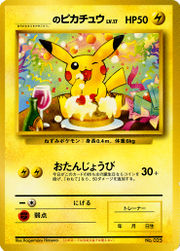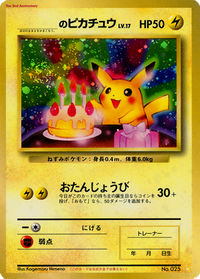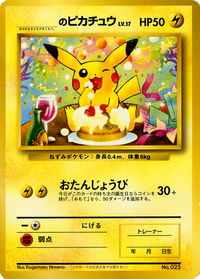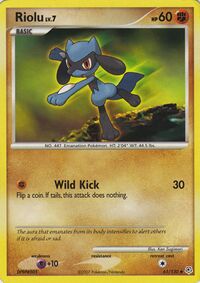From Bulbapedia, the community-driven Pokémon encyclopedia.
_____'s Pikachu LV.17
_____のピカチュウ _____'s Pikachu
|

|
|
|
|
| For more information on this Pokémon's species, see Pikachu.
|
|
_____'s Pikachu (Japanese: _____のピカチュウ _____'s Pikachu) is a Lightning-type Basic Pokémon card. It is one of the Wizards Black Star Promos.
Card text
|
|
Birthday Surprise
おたんじょうび
|
30+
|
|
| If it's not your birthday, this attack does 30 damage. If it is your birthday, flip a coin. If heads, this attack does 30 damage plus 50 more damage; if tails, this attack does 30 damage.
|
|
Pokédex data
Release information
This card was originally released as a promotional card with artwork by Kagemaru Himeno. In Japan, it was available as an insert with the Pokémon 2nd Anniversary Calendar, released in 1999. The English version was available through a Wizards of the Coast mail campaign, which ran from September to November 2000. It was later reprinted with new artwork by the same artist in Japan as a promotional card for the sixth volume of the manga series, How I Became a Pokémon Card released in September 2001. The Japanese Natta Wake promotional version was printed on non-glossy card stock.
Gallery
|
|
|
|
| Natta Wake Promotional print
|
|
|
|
|
|
|
|
|
|
|
|
|
|
|
|
|
|
|
|
|
|
|
Trivia
- This card is popularly known as Happy Birthday Pikachu, in reference to the illustration.
- At the height of the Pokémon phenomenon, the Japanese version was one of the most sought after cards in the world, after a rumor spread by Japanese and American dealers that it had a very limited print run and that within weeks of its initial release, it had sold out. The craze that followed saw the card sell as much as $500 overseas. After it emerged the card was not that rare, the demand and price declined.
- The card was immediately banned by Wizards upon its release, due to the fact that any player could claim it was their birthday in order to gain the potential 50 extra damage on the card's attack. This ban covered both the Unlimited format and the Modified format, one of only two cards to fall under this distinction (Ancient Mew is the other). Both Japanese prints have the clause "(This card can't be used in official tournaments)" on the card bottom.
Origin




